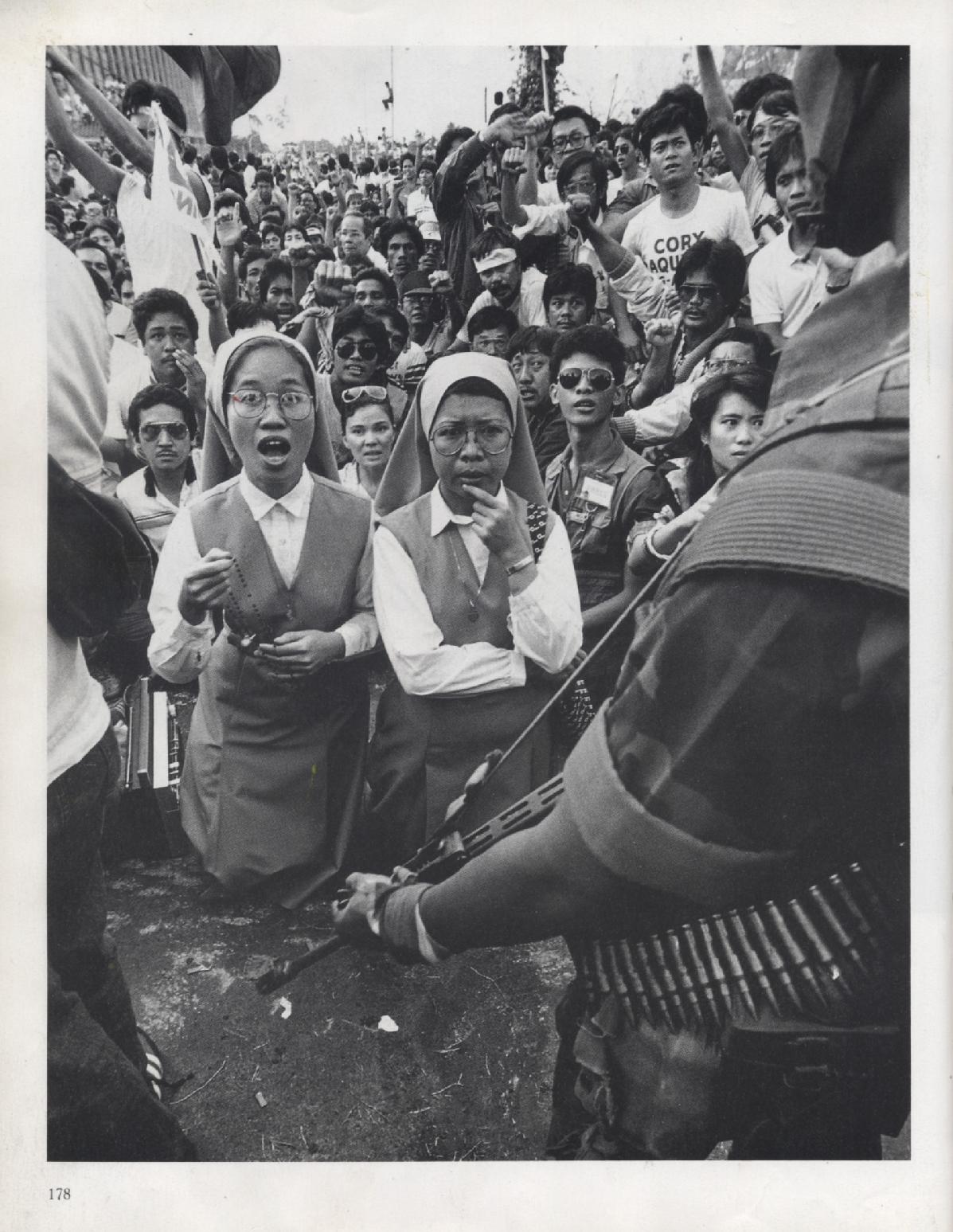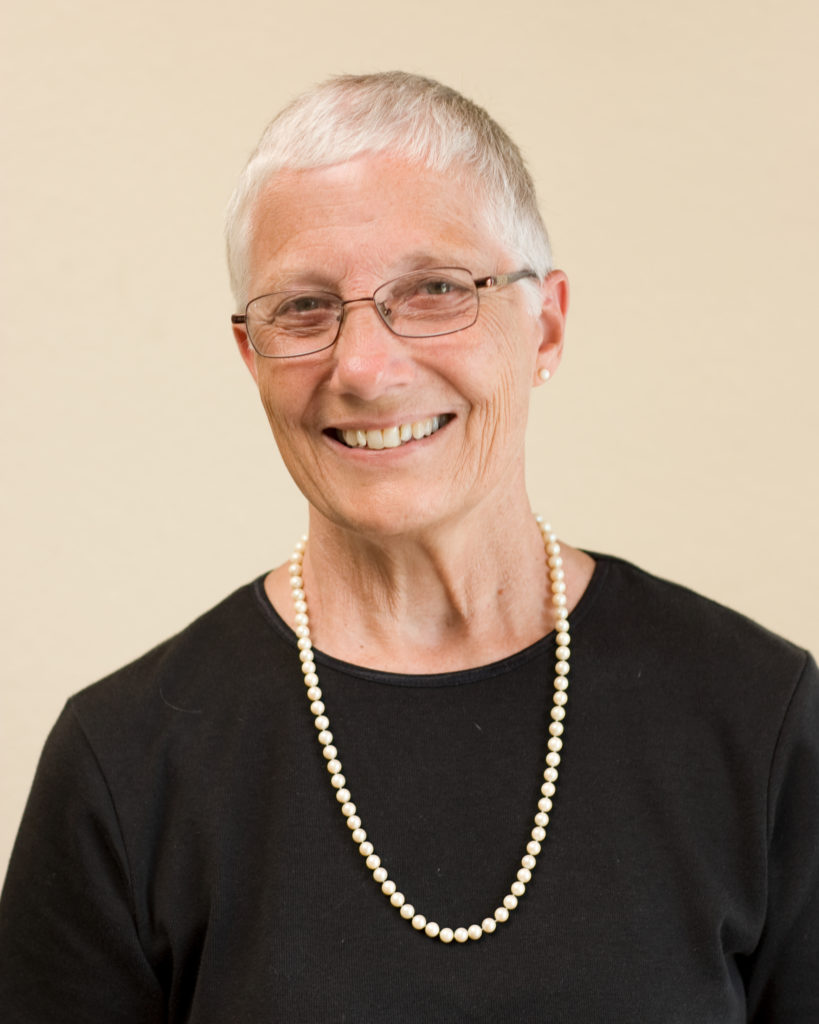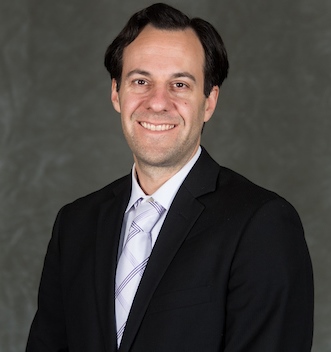Presented by Marie Dennis, Sharon Erickson Nepstad, and Eli McCarthy on Thursday, September 5, 2019, at 12 pm EDT.
Webinar Content:
- Introduction of Speaker: 00:00 – 4:40
- Presentation: 4:41 – 37:54
- Marie Dennis: 4:41 – 11:32
- Sharon Erickson Nepstad: 11:33 – 23:19
- Eli McCarthy: 23:20 – 37:54
- Questions and Answers: 37:55 – 1:00:49
Webinar Summary:

Photograph by Pete Reyes, The Manila Times.
In this webinar, we heard from a scholar and two members of the Catholic Nonviolence Initiative as they described CNI’s efforts to deepen the Catholic Church’s understanding of and commitment to “active nonviolence” with a particular focus on civil resistance as a key tool in promoting social justice. Marie Dennis introduced the Catholic Nonviolence Initiative and its engagement through two major conferences with the Vatican. Sharon Nepstad gave more context on the historical role of Catholics in civil resistance movements. Eli McCarthy shared what the Catholic Nonviolence Initiative is doing now to increase the understandings and skills of nonviolent resistance among Catholics.
Presenter Profiles:
 Marie Dennis serves on the executive committee of the Catholic Nonviolence Initiative, a project of Pax Christi International. She was on the Board of Pax Christi International for 20 years and served as co-president from 2007 to 2019. She is a Pax Christi USA Ambassador of Peace. Marie was director for 15 years of the Maryknoll Office for Global Concerns. She is author or co-author of seven books and editor of the award-winning Orbis Book, Choosing Peace: The Catholic Church Returns to Gospel Nonviolence. Marie was named person of the year by the National Catholic Reporter in 2016 and received honorary doctorates from Trinity Washington University and Alvernia University.
Marie Dennis serves on the executive committee of the Catholic Nonviolence Initiative, a project of Pax Christi International. She was on the Board of Pax Christi International for 20 years and served as co-president from 2007 to 2019. She is a Pax Christi USA Ambassador of Peace. Marie was director for 15 years of the Maryknoll Office for Global Concerns. She is author or co-author of seven books and editor of the award-winning Orbis Book, Choosing Peace: The Catholic Church Returns to Gospel Nonviolence. Marie was named person of the year by the National Catholic Reporter in 2016 and received honorary doctorates from Trinity Washington University and Alvernia University.
 Sharon Erickson Nepstad is Distinguished Professor of Sociology at the University of New Mexico. At UNM, she has served as both Chair of Sociology and as Director of Religious Studies. She has been a visiting fellow at Princeton University’s Center for the Study of Religion and at Notre Dame’s Kroc Institute for International Peace Studies. She is the author of five books: Catholic Social Activism: Progressive Movements in the United States (2019, New York University Press), Nonviolent Struggle: Theories, Strategies, and Dynamics (2015, Oxford University Press), Nonviolent Revolutions: Civil Resistance in the Late 20th Century (2011, Oxford University Press), Religion and War Resistance in the Plowshares Movement (2008, Cambridge University Press), and Convictions of the Soul: Religion, Culture, and Agency in the Central America Solidarity Movement (2004, Oxford University Press).
Sharon Erickson Nepstad is Distinguished Professor of Sociology at the University of New Mexico. At UNM, she has served as both Chair of Sociology and as Director of Religious Studies. She has been a visiting fellow at Princeton University’s Center for the Study of Religion and at Notre Dame’s Kroc Institute for International Peace Studies. She is the author of five books: Catholic Social Activism: Progressive Movements in the United States (2019, New York University Press), Nonviolent Struggle: Theories, Strategies, and Dynamics (2015, Oxford University Press), Nonviolent Revolutions: Civil Resistance in the Late 20th Century (2011, Oxford University Press), Religion and War Resistance in the Plowshares Movement (2008, Cambridge University Press), and Convictions of the Soul: Religion, Culture, and Agency in the Central America Solidarity Movement (2004, Oxford University Press).

Eli McCarthy teaches at Georgetown University in Washington DC in Justice and Peace Studies. Eli has published a book called “Becoming Nonviolent Peacemakers: A Virtue Ethic for Catholic Social Teaching and U.S. Policy,” (2012) and has a forthcoming book “A Just Peace Ethic Primer: Breaking Cycles of Violence and Building Sustainable Peace (2020). He has published numerous journal articles and published online in The Hill, Huffington Post, National Catholic Reporter, and America Magazine. He also serves as the Director of Justice and Peace for the Conference of Major Superiors of Men, which is the leadership conference of all the U.S. Catholic men’s religious orders. This enables him direct advocacy experience on influencing U.S. policy and organizing collective actions of strategic nonviolent resistance. He serves on the global steering committee of the Catholic Nonviolence Initiative and also chairs the CNI educational committee.
Relevant Readings:
Appeal to Catholic Church to Re-Commit to the Centrality of Gospel Nonviolence
Advancing Just Peace through Strategic Nonviolent Action by Dr. Maria J. Stephan
2017 World Day of Peace message by Pope Francis
Peace Movements and Religion in the U.S. by Sharon Erickson Nepstad
Just Peace Ethic Handout
Additional Q & A:
In launching the Catholic Nonviolence Initiative, what were some helpful aspects of getting this going and gaining traction among Catholic institutions? Has there been pushback from the Just War crowd? How did you navigate that?
We have been quite clear that active nonviolence, which includes civil resistance, which we focused the webinar on, is neither passive nor the same as pacifism and have consistently pointed to the importance of countering structural, systemic and cultural violence as well as direct violence and of working for just and sustainable peace. We describe “nonviolence” as a way of life consistent with Catholic spirituality, a powerful way of following the example of Jesus, who actively and nonviolently confronted the injustice and violence of his times, and can be done strategically and effectively. Our emphasis has been on the diversity and proven effectiveness of many nonviolent approaches to transforming conflict, interrupting or preventing violence, protecting vulnerable communities and promoting just peace, as well as civil resistance. That seems to be helping to stretch imaginations about the potential of nonviolent strategies to help us break out of perpetual cycles of violence.
Yes, there has been pushback from those who espouse the just war tradition because they believe it should make war rare or that nonviolent alternatives are not powerful enough.. Beyond what we said in the original Appeal to the Catholic Church to Recommit to the Centrality of Gospel Nonviolence (We believe that there is no “just war”. Too often the “just war theory” has been used to endorse rather than prevent or limit war. Suggesting that a “just war” is possible also undermines the moral imperative to develop tools and capacities for nonviolent transformation of conflict. And the Church should no longer use or teach “just war theory”.), we have spoken about the importance of leaving the language of “just war” behind. We have also repeatedly emphasized the value and effectiveness of nonviolent action. We invited several of those who were not happy with our Appeal comments about the just war tradition to participate in our roundtable process that attempted to articulate a new moral framework based on active nonviolence for Catholic teaching on war and peace.
We have also worked to develop a new moral framework, i.e. a nonviolent just peace ethic that can better prevent and limit war; but also do a number of other things as mentioned in the webinar. Then we ask them to consider this, if preventing and limiting war is what they also intend. Some people are ready for this discussion, while others are still defensive and often need space or to learn more about nonviolent action strategies.
Are there any other religious traditions, Christian or otherwise, that are following the lead of the Catholic Nonviolence initiative to cause such a shift in in orientation, values, knowledge and skills re” “active nonviolence” in general and civil resistance in particular?
Several other religious traditions have been committed to active nonviolence for a long time – the Quakers, Mennonites and Church of the Brethren, the United Church of Christ/Disciples of Christ. The World Council of Churches and others have done significant work on just peace. Many other faith traditions have important teachings on nonviolence as an ethical frame and have experimented with the strategic technique of civil resistance. The CNI is focused on the institutional Catholic Church because of the size and capacity of the Catholic Church to make a difference at a macro level. We are open to collaboration with others, however.
Has there been any progress made towards getting Pope Francis to fully endorse your work within the Catholic Church by issuing an encyclical on “active nonviolence” and civil resistance—as well as rethink Just War thinking?
Following our first conference in April 2016, Pope Francis wrote his 2017 World Day of Peace message on Nonviolence: A Style of Politics for Peace, a first major document on nonviolent action strategies for positive change. He has frequently referred to nonviolent action in his speeches and writing since then. We have a positive working relationship with the Vatican through the Dicastery for Promoting Integral Human Development and other offices. Only the Pope decides when to write an encyclical.
Since Vatican II, the Popes have been questioning and de-emphasizing just war thinking. The broader church still has a way to go in this area, though.
The pacifist/moral witness tradition within the Catholic Church often views civil disobedience as an activity reserved for a saintly few. How is CNI working to get the institutional Church to move a concern with nonviolent resistance as a strategic, mass movement approach from the periphery to the center of the Church. Do you think that Church leaders will participate directly in broad-based acts of civil resistance, as a sign that the church, as a whole institution, will resist injustice as a central part of Church activity?
CNI is working at every level (global/Vatican, regional and local – with hierarchy/local bishops and bishops conferences, religious communities, Catholic universities, seminaries, peace activists, theologians, etc.) to move the mechanisms of education, theological reflection, diplomacy/policy advocacy, media and communications, prayer and liturgy in the Catholic Church to prioritize nonviolent approaches to promoting just, integral peace. We are urging the Church to prioritize nonviolent relationships internally as well, changing the power-over clericalism that has too often been dominant. We want the Catholic Church to understand, promote and embrace nonviolent action as central to its way of functioning in the world. We believe that will include a broad spectrum of nonviolent practices and when strategic will include nonviolent resistance involving the whole Catholic community and Church leadership. We also try to model it in particular campaigns, such as the migrant children one in the U.S.
Does Catholic Nonviolence Initiative efforts engage with or address the widespread prejudice against LGBTQIA+ people often propagated in the name of God? Is this something that CNI takes on in any way?
We believe that a Church committed to nonviolence will experience a radical shift in practice from clericalism and exclusion to just and inclusive relationships with all people and all beings.
In some cases nonviolent civil resistance actions turn violent—at least at the margins. How can we help keep these actions focused on civil resistance strategies and tactics to increase movement effectiveness and moral clarity?
Participative decision-making about the context and the nature of an action, good training and accurate information about the effectiveness of nonviolent civil resistance (as well as about the damage done by violence even at the margins), as well as good leadership, are key to the kind of discipline needed to keep actions focused on civil resistance. For people of faith, it also helps to include attention to the virtues of nonviolent action (empathy, mercy, humility, courage, etc.), spiritual disciplines (meditation, discernment, etc.), nonviolent skills, and creating nonviolent communities to stay focused on nonviolent civil resistance.
Do you see any future collaboration or a convergence between sectors of the Catholic Nonviolent Initiative and sectors of the Catholic pro-life movement?
CNI is urging the Catholic Church worldwide to prioritize nonviolent relationships and nonviolent strategies toward just and integral peace. Nonviolent action is not an additional issue in competition with all the issues of concern to the Catholic community; rather, it is a cross-cutting methodology for how we hope the Church and Catholic people will address all issues of social and ecological justice in these times. Nonviolent action should characterize the methodology and the goal of Catholic engagement in support of integral human development, integral ecology, integral peace.
In dictatorship, it is difficult to wage even nonviolent resistance. Any attempt, to stand up to a dictatorship, can be met with a violent, iron-fist response. So, in what way could CNI help in creating nonviolent resistance, help someone agitate, organize and wage civil-resistance in a country where any kind of resistance is repressed, including non-violent one is not seen in good eyes?
As CNI we believe that nonviolent action, including civil resistance, has to be contextually appropriate. Local people must determine the timing, nature and trajectory of any nonviolent action and carefully assess different strategies. In difficult situations where resistance is repressed, training in effective nonviolent approaches and access to the best available information on nonviolent strategies seem essential. Learning approaches from other situations where repression is common could be helpful. Recognizing the serious risks of any nonviolent action and the likely consequences of repressive violence are extremely important as well.